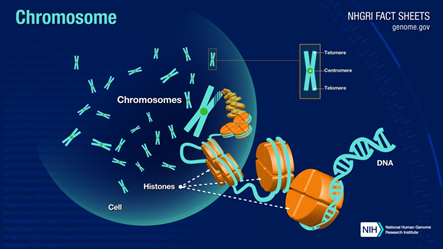

13th June 2022 (6 Topics)
Context
According to researchers at the universities of Cambridge and Exeter, around one in 500 men could be carrying an extra X or Y chromosome, most of them unaware.
About
Key findings of the study:
- By linking genetic data to routine health records, the team found that men with XXY have much higher chances of reproductive problems, including a three-fold higher risk of delayed puberty and a four-fold higher risk of being childless.
- These men also had significantly lower blood concentrations of testosterone.
- Men with XYY appeared to have a normal reproductive function.
- They are at increased risk of diseases such as type 2 diabetes, atherosclerosis and thrombosis.
Chromosomes:
- Chromosomes are thread-like structures located inside the nucleus of animal and plant cells.
- Each chromosome is made of protein and a single molecule of deoxyribonucleic acid (DNA).
- Passed from parents to offspring, DNA contains the specific instructions that make each type of living creature unique.
- The term chromosome comes from the Greek words for color (chroma) and body (soma).
- Function:
- The unique structure of chromosomes keeps DNA tightly wrapped around spool-like proteins, called histones.
- For an organism to grow and function properly, cells must constantly divide to produce new cells to replace old, worn-out cells.
- During cell division, it is essential that DNA remains intact and evenly distributed among cells.
- Chromosomes are a key part of the process that ensures DNA is accurately copied and distributed in the vast majority of cell divisions.
- It is also crucial that reproductive cells, such as eggs and sperm, contain the right number of chromosomes and that those chromosomes have the correct structure.
- If not, the resulting offspring may fail to develop properly. For example, people with Down syndrome have three copies of chromosome 21, instead of the two copies found in other people.

- If not, the resulting offspring may fail to develop properly. For example, people with Down syndrome have three copies of chromosome 21, instead of the two copies found in other people.
How many chromosomes do humans have?
- Humans have 23 pairs of chromosomes, for a total of 46 chromosomes.
- Of the 23 pairs of chromosomes, the first 22 pairs are called ""
- The final pair is called the "sex chromosomes."
- Sex chromosomes determine an individual's sex: females have two X chromosomes (XX), and males have an X and a Y chromosome (XY).
- The mother and father each contribute one set of 22 autosomes and one sex chromosome.
- In fact, each species of plants and animals has a set number of chromosomes. A fruit fly, for example, has four pairs of chromosomes, while a rice plant has 12 and a dog, 39.
Do males have different chromosomes than females?
- Sex chromosomes determine our biological sex. Men typically have one X and one Y chromosome, while women have two Xs. However, some men also have XXY or XYY.
- Inheriting too many or not enough copies of sex chromosomes can lead to serious problems.
- For example, females who have extra copies of the X chromosome are usually taller than average and some have mental disability.
- Males with more than one X chromosome have Klinefelter syndrome, which is a condition characterized by tall stature and, often, impaired fertility.
- Another syndrome caused by imbalance in the number of sex chromosomes is Turner syndrome.
- Women with Turner have one X chromosome only. They are very short, usually do not undergo puberty and some may have kidney or heart problems.


